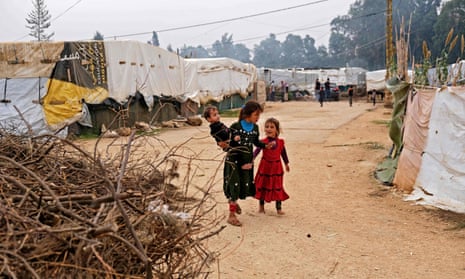As many as 14 million Syrians face a near insurmountable barrier to returning to their homes after the government passed laws giving the state power to seize their land and property, according to a report by the Syrian Network for Human Rights.
The report, shared with the Guardian, urged the UN high commissioner for refugees to highlight the laws as one of the main obstacles to refugees returning home.
It breaks new ground by examining in detail the web of laws passed by the government of President Bashar al-Assad both before and after the civil uprising that started in 2011, revealing how many laws would have to be recast if the displaced are to have a reason to return or obtain justice.
The long-ostracised Syrian government has returned to the diplomatic stage, with Assad attending an Arab League summit last Friday, a move towards normalisation that refugees in neighbouring Turkey, Lebanon and Jordan fear could lead to them being pushed back over the borders.
Fadel Abdul Ghany, the Syrian Network executive director, said: “People are afraid to go back because, even if they have documentation or access to civil registries to prove their ownership of a property, multiple laws have been passed that leave them with no rights, and in practice no compensation. The laws are being used as a carte blanche for the Syrian regime to take over all the strategic and important areas of Syria.”
He said the laws affect the families of the 500,000 Syrian civilians not yet registered as dead but mainly killed by the regime, 115,000 forcibly disappeared, as well as the 12.3 million people internally displaced within Syria or that have fled the country.
The research, the product of a year’s study of the property laws passed by the Syrian assembly or by government executive order, highlights the umbrella of legal difficulties that the families of Syrian exiles would face in trying to reclaim their previous land and property.
Discriminatory laws started with decree No. 66, passed in 2012 which was intended to redevelop informal settlements throughout Damascus, but in reality targeted opposition strongholds, according to the report.
A subsequent law, No. 23 of 2015, and officially named the planning and urban development law, gave powers to administrative units, such as municipalities and governorates, to deduct land, free of charge, from private properties located outside zoning areas.
Another law passed in April 2018 and subsequently amended later the same year after an outcry, allowed the government to expand the development area scheme first set up in Damascus to the whole of the country, giving property owners 30 days for an appeal to prove land or property ownership. The Syria Network report says the initial 30 day window, subsequently extended to a year, is “simply not enough for a displaced person whether refugee or displaced person to locate and prepare the necessary documents.”
after newsletter promotion
The report said the publicly stated objective of law 10 was to enable the reconstruction of properties destroyed by the military conflict. The result, it said, was to strip dissidents of their properties and redistribute them among the elite of regime loyalists by force.
Redevelopment zones have already been set up in the 78 hectares of Aleppo, one of the cities bombarded by the Syrian regime between 2013 and 2016.
Other interconnected property laws identified in the report include law 19 passed in 2012, which authorised the seizure and expropriation of property belonging to those deemed to be terrorists or threatening state security.
